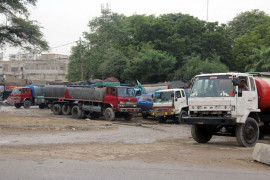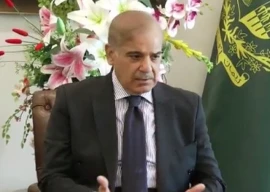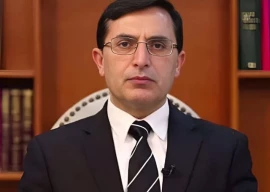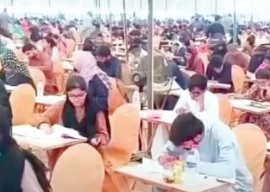
It was not the usual mad rush of passengers or the onslaught of porters that made Naveeduddin Khan anxious when he was about to board a train to Multan earlier this year. He was worried of how he was going to make it to his seat.
As the situation unfolded, some men lifted him off the platform and put him on the train. Once inside, he crawled on his elbows, bruising his arms and gathering dirt and greasy lubricant, while making his way to the seat. Getting on-board this way was humiliating - the story of all handicapped passengers travelling via trains.
But this episode was nothing compared to the embarrassment he endured while trying to book a flight on a private airline. “They don’t sell tickets to physically-challenged people,” he said angrily. “I had to cancel my family vacations to Islamabad as the airlines would not assist me.”
Khan has a leg deformity due to polio disease. For within city commute, he drives his especially modified three-wheeler automatic car but when it comes to travelling to other cities, he finds himself with limited options as two private airlines in the country - Shaheen Air and Airblue - do not entertain people requiring wheelchair access.

“Sorry, we don’t provide attendants and don’t allow wheelchairs inside the planes,” claimed a ticket-reservation operator at Shaheen Air. “Only those who can walk are permitted to travel.”
The attitude is no different at Airblue. “Handicapped persons would have to get their own attendants to carry them and climb up the stairs to the plane,” said an Airblue official. Wheelchairs cannot be taken to the plane as “there is no space for it,” he added.
Aviation rules
Shaheen Air has no provisions for disabled persons under the conditions of carriage. However, the conditions do state that the carrier has the right to refuse passengers requiring special assistance.
“We will have to load bridges to transport people requiring wheelchair access to planes,” a spokesperson for Airblue, Raheel Ahmed, said. “We don’t have them in Islamabad or Peshawar, and the ones in Karachi are always booked.”
Ahmed explains the risk involved in transporting such passengers. “Even if we provide a porter to carry the disabled persons through stairs, a slip from the porter could cost the airline a lot of money.”
Airblue’s spokesperson says that only the Pakistan International Airlines (PIA) has an ambulift - a crane to lift wheelchairs. “If we rent it from them, we will be charged in dollars.”
Expressing regret over such a problem, he said that the airline did take special children for the Paralympics last year but they have limitations. “Airblue has an all-female crew. Even if we take such passengers, who would help them use the bathroom?”
Meanwhile, Civil Aviation Authority’s spokesperson Mehmood Hussain said that it depended on the policy of the airlines of whether or not to assist such travellers. PIA complies with the rules of the US Department of Transportation on the travel of disabled persons. Under 14 CFR part-382 of the Air Carrier Access Act, airlines may not refuse transportation to people with disabilities. PIA’s spokesperson Mashood Tajwar confirmed that their attendants made sure that the handicapped persons were allowed on-board.
Violation of human rights?
Khan, who also runs the Disabled Welfare Association, has taken the matter to the Human Rights Commission (HRCP) of Pakistan. “Action should be taken against these airlines. Why are we being discriminated against? They should shutdown their operations if they cannot facilitate us.” HRCP coordinator in Sindh, Syed Shamsuddin, has written letters to both airlines, urging them to rectify their unfair policies.
Published in The Express Tribune, July 24th, 2013.
COMMENTS (7)
Comments are moderated and generally will be posted if they are on-topic and not abusive.
For more information, please see our Comments FAQ























Would pvt airlines take any action to buy air Ambulator etc to handle disable people ? Do they deserve to operate without these equipment ? Will they follow ICAO document on "Carriage of disabled persons" ?
Its my seventh year now in aviation ground handling. I'm working in one of the above mentioned airline. I have to say, most of the part of this story is mis-interpreted. If a person has physical problem such as he can't walk, he has operated, he is suffering from any disease due to which he's unable to move, both of the airline accept him just by filling an undertaking form or by a written statement from a doctor that he/she is fit to travel by air.
As i really hate Pakistan's media, who only shows you the bad part of story, without any deep investigation on the topic, the other part of story is really horrible. Once, I myself witnessed a female, who lied to the ground staff that she's not pregnant/or she didn't tell the correct pregnancy duration, she had a miscarriage on flight. Everyone blamed to the airline, while it was totally the fault of passenger who lied because she knew that airline won't accept a pregnant lady with over 32 weeks of pregnancy. I still remember that many mature make staff had tears in their eyes because of her screaming.
Now, if an airline is unable to handle a passenger with some serious problem, why should we take the pressure of media? It's the first rule of aviation: Safety first. Airlines are here to earn money, why would an airline lose a ticket? I would strongly recommend everyone to think more deeply on it. Yes, airlines should upgrade its fleet and ground equipment, but in case they don't have an equipment to handle a special passenger, there is not a better option for them other than a straight refusal.
About delay flights, its the worst thing we had in our aviation industry. Still, many improvements have been done by both airlines & CAA in recent years. I wish both airline & passenger become more educated about traveling.
AoA,
I strongly support the views of M/s Naveeduddin Khan & Mehmood Husain. Any airline of Pakistan is not supposed to refuse transportation of a person having physical challenge. This is against the spirit of the Federal Govt's Ordinance XL of 1981 or DPO-1981. The pvt airlines must read & understand the ICAO rules/ regulations under "disabled persons carriage". Fortunately, I am also the Chairman of the committee constituted by honourable DG CAA to address the problems being faced by disabled employees of CAA. The pvt airlines must address these issues on priority basis (within a month) or else we may escalate these issues to higher forums.
Syed Majid Husainie, Chairman, committee for disabled CAA employees. Cell : 0334 3279946
I absolutely agree, in many places the ground handling companies like Gerrys DNATA etc have specially appointed assistants to help differently abled people with wheelchairs etc and to stay with them throughout from outer boundary of airport till inside aircraft. I personally have had such experience in Lahore with Saudi Airlines, who call special porter with wheelchair. No queue, no nothing. Saudia staff checks you in, your family member can come inside the secure area to say good byes, then they take you to departure lounge, board on you on the plane before all other passengers. And they dont demand any charges.
Very strange, why Shaheen or Airblue can charge premium fare (Rs. 1000 difference with PIA on domestic sector) but not provide wheelchair? Shameful attitude.
Let us not forget, while raising this issue: 1) Massive delays by both Airblue and Shaheen Air.
2) Cases of lost, stolen or misplaced luggage.
3) Untrained or undertrained crew hired for something other than the ability to act in emergency situation.
4) Extreme rude attitude of sales/counter ticketing staff
5) No compensation/information in event of flight delay for many hours
Time to raise all these issues and ask government for proper operating rules for these private carriers.
God bless Pakistan and PIA.
Great issue raised. Govt please take notice
Khan sb we are with you. These airliners should shut down their operations if they can not facilitate physically challenged passengers
What pathetic excuses. "Who will help them use the bathroom"! Unbelievable. Airblue flys to the UK, they can be sued for such statements in the EU.